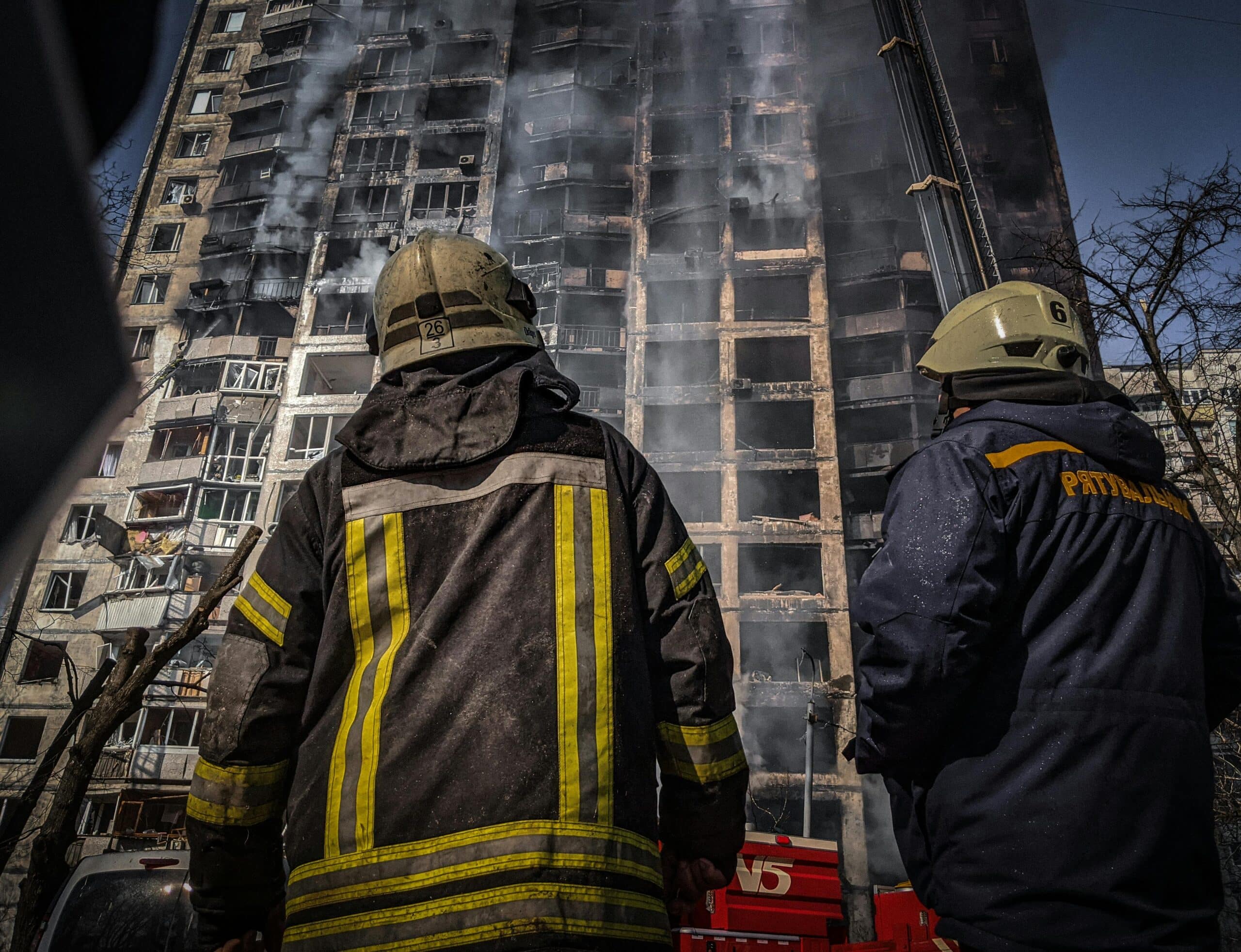In the middle of Ploshcha Rynok square in Lviv, Ukraine, where the Christmas market was held before the war, stands a memorial to the fallen soldiers. The sign on the memorial reads “real heroes know no fear. They know only the power of their own calling.”
In my visits to Lviv, my family’s hometown and a place I called home growing up, since the start of the full-scale invasion, I have admired the everyday bravery of everyday Ukrainians. The ability to persevere in the worst of conditions, to make light of situations where I personally have felt fearful, and to remember the meaning of independence — the ability to choose one’s own future.
As Russia’s full-scale invasion has entered its third year, I reflect on the heroes that have understood the very power of their calling. The soldiers who have given their lives to protect the Ukrainian people’s right to self-determination. The volunteers who provide medical aid and logistical support at the frontlines. The journalists who have not been afraid to speak their truth. Even the grandmothers who make pierogies for the frontlines. I reflect on the heroes whose stories we will never know, and those who have faced atrocities committed by Russia that I cannot even imagine.
Yet, as Russia’s full-scale invasion enters a third year, the focus of the future of Ukraine has been diminished to a political battle between the U.S. and Russia. The framing of the war in Ukraine as a U.S.-Russia proxy war has ultimately put the lives of over 40 million people at risk, as well as threatened the safety and security of the European continent.1
Since February of 2022, the U.S. government has provided Ukraine with $46.3 billion of military aid out of the approximately $96 billion of military aid Ukraine has received from the top 20 donors.2 This contributes to nearly 50% of Ukraine’s military donations, demonstrating the importance of continued U.S. support for Ukraine. The next round of supplemental funding, however, has stalled in the U.S. Congress for months, despite the fact that most of the military aid funding allocated to Ukraine supports U.S. companies in producing weapons and equipment for shipment to Ukraine.3 The supplemental funding bill would secure military assistance to Ukraine through 2024, allowing EU institutions to build up their own military capabilities in order to better support Ukraine starting in 2025.4 The EU committed 50 billion euro package to Ukraine, providing continued aid to Ukraine through 2027, and showcasing a long-term commitment to Ukraine’s future.5 Yet the positionality of U.S. Senate Republicans blocking U.S. aid, supported by Speaker of the House Mike Johnson, to Ukraine is not to protect U.S. interests, but to align with those of former President Trump.6
U.S. Congressional support for the former president’s policies on Russia, however, ultimately aligns with supporting the interests of the Russian regime. Former President Trump has held a dangerously close relationship with President Putin. Russia’s meddling in the 2016 election was just the beginning of Russia’s interference in U.S. affairs, and Trump’s own allegiance with Putin’s regime. Notably, during the Helsinki Summit in 2018, Trump sided with Putin over his own U.S. intelligence.7 Trump also held countless private meetings with Putin, icing out his own senior advisors. A recent U.S. intelligence assessment showed that Russia continues to influence state-run media to erode public faith in the integrity of democratic elections, not only in the U.S., but in over 100 countries worldwide.8 Yet, Congress’s alliance with Trump’s policies illustrates a dangerous allegiance with the Russian anti-democratic regime. Furthermore, for Putin and Russia, the domestic impasse in U.S. Congress provides the ideal scenario for Russia to re-think its own global strategy. Russia builds up its military capabilities, strengthens its ties to regional and global allies, and rebounds its war-time economy. The stalling of military aid to Ukraine is allowing Russia to gain power, demonstrating yet again how Trump’s policies prioritize and align with dangerous authoritarian regimes over the safety and security of the American people.
Ultimately, Russia’s full-scale invasion of Ukraine, where the sovereignty of the lives of over 40 million people is at stake, has become just a pawn in a political campaign. It raises the question — how can the U.S. provide Ukraine the security guarantees it promised under the Budapest Memorandum and set up Ukraine to be well-placed and integrate into EU institutions to establish long-term sustainability?9 Ultimately, how can everyday Ukrainians be better positioned with long-term support for Ukraine to achieve victory and stability in the country?
- Maura Reynolds, “‘We’ll Be at Each Others’ Throats’: Fiona Hill on What Happens If Putin Wins,” Politico, December 12, 2023, https://www.politico.com/news/magazine/2023/12/12/fiona-hill-ukraine-putin-00131285. ↩︎
- Jonathan Masters and Will Merrow, “How Much Aid Has the U.S. Sent Ukraine? Here Are Six Charts.” Council on Foreign Relations, February 23, 2024, https://www.cfr.org/article/how-much-aid-has-us-sent-ukraine-here-are-six-charts. ↩︎
- Connor O’Brien and Joe Gould, “Critics Say Border Bill Would Send $60B to Ukraine. Here’s Where It’s Really Going.” Politico, February 6, 2024, https://www.politico.com/news/2024/02/06/border-bill-ukraine-aid-military-00139870. ↩︎
- Gideon Rachman, “Trump’s Betrayal of Ukraine,” Financial Times, February 5, 2024, https://www.ft.com/content/18c5296a-f0d5-47d5-aacd-af5210d638fc. ↩︎
- Charlotte Van Campenhout, “EU Agrees 50 Bln Euro Ukraine Aid Package – What Are the Reactions?” Reuters, February 1, 2024, https://www.reuters.com/world/europe/eu-agrees-50-bln-euro-ukraine-aid-package-what-are-reactions-2024-02-01/. ↩︎
- Anne Applebaum, “Why Is Trump Trying to Make Ukraine Lose?” The Atlantic, February 29, 2024, https://www.theatlantic.com/ideas/archive/2024/02/one-global-issue-trump-cares-about/677592/. ↩︎
- Jeremy Diamond, “Trump Sides with Putin over US Intelligence,” CNN, July 16, 2018, https://www.cnn.com/2018/07/16/politics/donald-trump-putin-helsinki-summit/index.html. ↩︎
- Jonathan Landay and Simon Lewis, “US Intelligence Report Alleging Russia Election Interference Shared with 100 Countries,” Reuters, October 20, 2023, https://www.reuters.com/world/us/us-intelligence-report-alleging-russia-election-interference-shared-with-100-2023-10-20/. ↩︎
- Mariana Bedjeryn, “The Breach: Ukraine’s Territorial Integrity and the Budapest Memorandum,” Wilson Center: Nuclear Proliferation International History Project,” https://www.wilsoncenter.org/sites/default/files/media/documents/publication/Issue%20Brief%20No%203–The%20Breach–Final4.pdf. ↩︎
